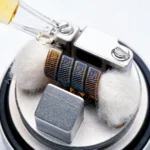Vaping has become a popular alternative to traditional smoking, touted for its variety of flavors and perceived as a safer option. However, many individuals find themselves grappling with an uncomfortable side effect – irritation in the throat.
This discomfort can detract significantly from the experience, turning what many hope to be a pleasant or harm-reducing habit into a source of persistent annoyance and discomfort. The significance of addressing this issue cannot be overstated. While vaping is often seen as a less harmful alternative to smoking, it’s essential to understand and mitigate its side effects.
An Overview

Vaping involves inhaling and exhaling the aerosol, often referred to as vapor, produced by an e-cigarette or similar device. These devices heat a liquid—commonly called e-juice or vape juice—that typically contains nicotine, flavorings, and other chemicals.
One of the main components of e-juice is propylene glycol (PG) and vegetable glycerin (VG), which are used to create the vapor. While these ingredients are generally considered safe for consumption, they can sometimes cause irritation in sensitive individuals, especially when inhaled.
Nicotine, another common ingredient, can also contribute to this discomfort, as it has a drying effect on the mucous membranes. Learning more about these ingredients and their potential effects is crucial for identifying why vaping might cause throat discomfort. The irritation can be a result of the body reacting to one or more components in the vape juice or the physical sensation of the vapor itself.
Immediate Relief Methods
When experiencing discomfort after vaping, there are several immediate remedies you can try. One of the simplest and most effective is staying adequately hydrated. Drinking plenty of water helps to soothe the throat and keeps the mucous membranes moist, which can alleviate irritation.
Another traditional method is gargling. A saltwater solution can help to ease discomfort and reduce swelling. Herbal teas, like chamomile or peppermint, are also beneficial due to their natural soothing properties. Gargling with these warm teas can provide quick relief.
Additionally, using a humidifier in your living space can introduce more moisture into the air, helping to relieve dryness that can exacerbate throat discomfort. Inhaling steam, perhaps with a few drops of eucalyptus or menthol oil, can also provide immediate relief by moisturizing the throat and opening up the airways.
| Method | Description | Efficiency |
|---|---|---|
| Hydration | Drinking plenty of water to keep the throat moist and soothe irritation. | High |
| Gargling Solutions | Gargling with saltwater or herbal teas to reduce swelling and discomfort. | Medium to High |
| Humidifiers | Using a humidifier to add moisture to the air and alleviate dryness. | Medium |
| Steam Inhalation | Inhaling steam to moisten the throat and open airways, possibly with added essential oils like eucalyptus or menthol. | Medium |
Long-term Solutions

To address the issue in the long term, consider adjusting your vaping device’s settings. Lowering the temperature and reducing the power can make the vapor less harsh on your throat. It’s also important to pay attention to the e-liquid you’re using.
E-liquids with a higher VG to PG ratio tend to be smoother and less irritating. Additionally, reducing the nicotine strength can be beneficial, as nicotine can contribute to dryness and irritation. Maintaining good oral hygiene is also crucial. Vaping can affect oral health, so regular brushing, flossing, and using mouthwash can help keep your mouth and throat healthy.
Alternative Remedies and Supplements
In addition to the more conventional methods, there are several alternative remedies and supplements that can provide relief. Natural remedies like honey, which has anti-inflammatory and soothing properties, can be especially beneficial. Adding it to tea or simply taking a spoonful can help coat and calm the throat. Ginger is another excellent option.
Known for its anti-inflammatory properties, it can be consumed as a tea or in its raw form. Chamomile, too, is known for its soothing effects and can be helpful when consumed as a tea. Over-the-counter options like throat lozenges and sprays can also provide temporary relief.
They often contain ingredients like menthol or eucalyptus, which can cool and soothe the throat. Additionally, certain vitamins and supplements may help. Vitamin C, for example, is known for its immune-boosting properties and can aid in overall throat health. Similarly, zinc supplements can help in maintaining immune function and potentially speed up recovery from irritation.
| Remedy/Supplement | Description | Efficiency |
|---|---|---|
| Honey | Known for its anti-inflammatory and soothing properties, honey can be taken alone or added to tea. | High |
| Ginger | Used for its anti-inflammatory effects, ginger can be consumed as tea or in its raw form. | Medium to High |
| Chamomile | Chamomile tea is beneficial for its natural soothing effects. | Medium |
| Throat Lozenges and Sprays | Over-the-counter options that often contain ingredients like menthol or eucalyptus to cool and soothe the throat. | Medium |
| Vitamin C | Helps with immune system support and overall throat health. | Medium |
| Zinc Supplements | Can aid in maintaining immune function and potentially speed up recovery from irritation. | Medium |
Lifestyle Changes

In the long run, the best course of action may be to reduce or completely stop vaping, especially if the throat discomfort is persistent or severe. This can be a challenging step for many, but it is often the most effective way to eliminate the issue. Beyond vaping, other lifestyle factors can contribute to throat health.
A balanced diet rich in fruits, vegetables, and whole grains can support overall health and immunity. Avoiding other irritants like cigarette smoke and excessive alcohol can also be beneficial. Stress management is another crucial factor.
High stress levels can weaken the immune system and make the body more susceptible to irritation and discomfort. Practices like meditation, yoga, or regular exercise can be effective in managing stress.
Overall, there is a negative impact made by the promotion of e-cigarettes. According to the Gabriele Baniulyte from Oral and Maxillofacial Department:
“the prevalent use of e-cigarettes in public spaces appears to normalise smoking behaviours, especially among youth who increasingly perceive vaping as a socially acceptable alternative”
When to See a Doctor?
While many cases of throat discomfort related to vaping can be managed with home remedies and lifestyle adjustments, it’s important to recognize when professional medical advice is needed. If the discomfort persists despite trying various remedies, it may be a sign of a more serious condition that requires medical attention.
Be on the lookout for symptoms such as severe pain, difficulty swallowing, persistent coughing, or signs of infection like fever. These could indicate conditions like pharyngitis, laryngitis, or even an allergic reaction. In such cases, visiting a healthcare provider is crucial to get a proper diagnosis and treatment.
Additionally, if you have pre-existing health conditions, especially respiratory issues like asthma or chronic bronchitis, it’s advisable to consult with a doctor before continuing or modifying your vaping habits.
Prevention Tips
Preventative measures are key in avoiding throat discomfort associated with vaping. Start by familiarizing yourself with the best practices for vaping. This includes using high-quality e-liquids, regularly cleaning your vaping device, and replacing coils and wicks as needed to prevent the build-up of harmful residues.
When choosing e-liquids, opt for those with a higher VG content, as they tend to be gentler. Also, consider using e-liquids with lower nicotine levels to reduce the likelihood of irritation. Regular maintenance of your vaping equipment plays a crucial role in prevention.
Keeping your device clean and in good working order ensures that you’re inhaling vapor from a clean source, minimizing the risk of irritation. Staying informed about the latest research and health information related to vaping can also help you make better choices and understand the potential risks involved.
FAQs
Can switching to a different brand of e-liquid reduce throat discomfort?
Yes, switching brands can sometimes help, as different brands use varying levels of ingredients like propylene glycol (PG) and vegetable glycerin (VG), which can impact throat comfort. Trying a brand with a higher VG ratio may be gentler.
Are certain flavors of vape juice more likely to cause throat discomfort?
Some users report that certain flavors, particularly citrus or cinnamon-based ones, can be more irritating. Opting for milder or natural flavors might reduce discomfort.
Can vaping lead to long-term changes in voice quality?
Chronic irritation from vaping can potentially affect voice quality, leading to hoarseness or a harsher tone. However, this varies widely among individuals.
Are there specific signs that indicate when to stop vaping due to throat discomfort?
Persistent pain, difficulty swallowing, or a significant change in voice should prompt reevaluation of vaping habits. If symptoms continue, it’s advisable to consult a healthcare professional.
Is vaping without nicotine less likely to cause throat discomfort?
Vaping without nicotine can reduce throat discomfort for some individuals, as nicotine contributes to throat dryness and irritation. However, other factors like the PG/VG ratio and flavorings also play a significant role.
Summary
Vaping can lead to various side effects, primarily affecting the throat and mouth. Alternative remedies like honey and ginger, as well as lifestyle changes, can also be beneficial. It’s crucial to recognize when professional medical help is needed and to be aware of vaping’s potential long-term effects.






